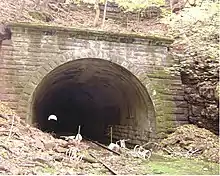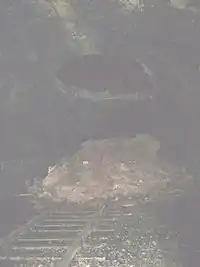Phoenixville Tunnel
The Phoenixville Tunnel, originally called the Fairview Tunnel, was part of the Pennsylvania Schuylkill Valley Railroad in Phoenixville, Pennsylvania.
 North portal of the tunnel. | |
| Overview | |
|---|---|
| Line | Schuylkill Branch |
| Location | Phoenixville, Pennsylvania |
| Coordinates | 40.144008°N 75.526420°W |
| System | Pennsylvania Railroad Conrail |
| Start | 1884 |
| Operation | |
| Constructed | Stone Brick |
| Technical | |
| Length | 809.75 ft, 246.75 m |
| No. of tracks | Double, later single |
The ends of the Phoenixville Tunnel are located at 40°08′36″N 75°31′36.6″W and 40°08′30.8″N 75°31′39.9″W.
History

The tunnel was built in 1884. It is approximately 809.75 feet long and 24 feet 8 inches wide. The tunnel, which was later acquired by the Pennsylvania Railroad, runs parallel to the west of Fairview Street, underneath Fillmore Street.
After the First World War increasing competition from automobiles and trucks led to passenger train services being discontinued in 1928. However, freight services continued to use the line. The line, which was used by Conrail from Kimberton to Phoenixville, was abandoned in the 1980s.
It is near the 1835 Phoenixville Black Rock Tunnel 40.147833°N 75.518497°W, the third railroad tunnel to be built in the United States.
Present day

The tunnel is now abandoned. The original brick construction is in poor repair. A large part of the ceiling has collapsed directly under Fillmore Street prompting a three-ton gross vehicle weight limit on the road above.
The Pennsylvania Schuylkill Valley Railroad rail right of way is being developed into the Schuylkill River Trail, a multi-use recreational / bicycle trail. However, it is not clear if the tunnel will be included.
Bibliography
- Bernhart, Benjamin L (2006). Pennsylvania Railroad in the Schuylkill River Valley: the Story of the PRR's Schuylkill Division. ASIN B000KSZCNC.
External links
| Wikimedia Commons has media related to Phoenixville Tunnel. |
- Van Harlingen, M. (May 1885). "The Pennsylvania Schuylkill Valley Railroad Tunnel at Phoenixville". Proceedings of the Engineers' Club of Philadelphia. Philadelphia: Engineers' Club of Philadelphia. V (1): 3–7.